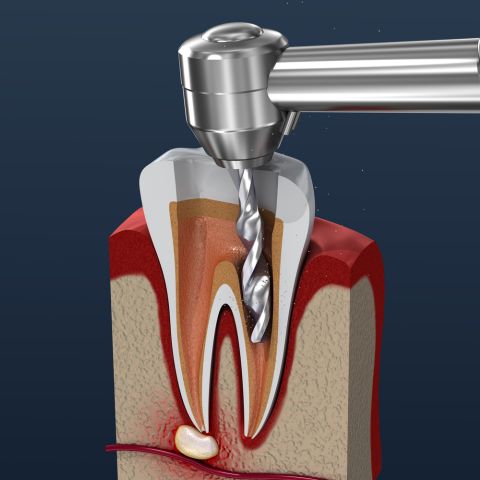

A root canal treatment, often simply referred to as a "root canal," is a dental procedure designed to treat infection within the pulp (the innermost soft tissue) of a tooth. This infection can be a result of tooth decay, dental injuries, or cracked fillings, and if left untreated, can lead to pain, swelling, abscesses, and even tooth loss.
The procedure involves:
- Accessing the infected tooth: The dentist or endodontist (a specialist in tooth pulp) will start by numbing the tooth and placing a rubber dam around it to keep it dry and free of saliva. An opening is then made in the crown (top) of the tooth.
- Removing the infected pulp: Using specialized instruments, the infected or damaged pulp tissue is removed from the tooth chambers.
- Cleaning and shaping the root canals: After removing the pulp, the inner chamber and root canals are cleaned, enlarged, and shaped to prepare them for filling.
- Filling the canals: Once cleaned and shaped, the canals are filled with a biocompatible material, often a rubber-like substance called gutta-percha. The access hole is then sealed with a filling.
- Restoration: In many cases, a tooth that has had a root canal will require further restoration, such as a crown, to protect it from fracture and restore its full function.
The primary goal of a root canal treatment is to save the tooth by removing the infected or damaged tissue and preventing further infection. It is a common procedure with a high success rate, allowing patients to maintain their natural teeth and avoid extractions.
Pros:
- Tooth Preservation: One of the main advantages of a root canal treatment is that it allows for the preservation of the natural tooth, preventing the need for an extraction.
- Relief from Pain: An infected tooth can be extremely painful. A root canal provides relief by eliminating the source of the infection and associated pain.
- Cost-Effective: In the long run, saving a natural tooth through a root canal can be more cost-effective than extracting and replacing it with a bridge or implant.
- Prevents Spread of Infection: By treating the infection at its source, a root canal can prevent it from spreading to neighboring teeth or into the bloodstream.
- Restores Normal Function: Once the procedure is completed and the tooth is restored (often with a crown), patients can usually return to their normal chewing and biting functions without discomfort.
Cons:
- Discomfort: Like any dental procedure, there can be some discomfort during and after a root canal. However, modern techniques and anesthetics have made the procedure much more comfortable than in the past.
- Tooth Discoloration: Sometimes, a tooth that has undergone a root canal can become slightly discolored over time. However, this can often be addressed with internal or external tooth whitening or with the placement of a crown.
- Potential for Breakage: A tooth that has had a root canal can become more brittle and prone to breakage. This is why many dentists recommend placing a crown on the treated tooth to protect it.
- Not Always 100% Effective: While root canals have a high success rate, there are cases where the infection might return, necessitating further treatment or, in rare cases, extraction.
- Complexity: Some teeth, especially molars with multiple root canals, can be challenging to treat, potentially requiring the skills of a specialist endodontist and multiple visits.
- Severe Toothache: One of the most telltale signs is a severe toothache, especially when chewing or applying pressure to the tooth.
- Extended Sensitivity: Prolonged sensitivity to hot or cold temperatures, even after the stimulus has been removed, can indicate a problem with the tooth's nerve or blood vessels.
- Discoloration or Darkening of the Tooth: A tooth turning dark or gray may be a sign of nerve damage or death inside the tooth.
- Swelling and Tenderness in the Nearby Gums: Swelling or tenderness in the gums surrounding a tooth can be an indicator of an infection that's spread from the tooth root.
- Pimple on the Gums: The presence of a recurring or persistent pimple on the gums, often filled with pus (known as a dental abscess or sinus tract), can be a sign of an underlying infection.
- Prolonged Pain or Discomfort: Even if it's not severe, prolonged pain or discomfort can indicate an issue that needs attention.
- A Bad Taste in the Mouth: An ongoing bad taste or bad breath might be due to an infection draining into the mouth.
- Tooth Mobility: An increased mobility or looseness of a tooth could be a sign of an infection weakening the supporting bone.
The root canal treatment process typically follows these steps:
1. Diagnosis and X-ray: If a dentist suspects you might need a root canal, they will first take an X-ray to get a clear view of the tooth and the surrounding bone to identify the extent of the infection or damage.
2. Local Anesthesia: Before beginning the procedure, the dentist will administer local anesthesia to numb the affected tooth, ensuring the patient feels no pain during the treatment.
3. Tooth Isolation: A rubber dam is placed around the tooth to keep it dry and free from saliva, providing a sterile environment for the procedure.
4. Creating an Access Hole: The dentist makes an opening in the crown (top) of the tooth to access the pulp chamber and root canals.
5. Removing the Infected Pulp: The dentist will then remove the infected or damaged pulp tissue from the tooth using specialized instruments.
6. Cleaning and Shaping the Canals: The canals are then cleaned, enlarged, and shaped using a series of files. The dentist may also use antimicrobial solutions to help kill any remaining bacteria and reduce the risk of further infection.
7. Filling the Canals: Once cleaned and shaped, the canals are filled with a biocompatible material, often gutta-percha, to seal the space. The access hole is then sealed with a temporary or permanent filling.
8. Restoration: Most teeth that undergo a root canal will require further restoration to regain their full functionality and appearance. This usually means placing a crown on the treated tooth. In some cases, additional dental work like a post might be needed to provide adequate support for the crown.
The duration of a root canal treatment can vary based on several factors, including the severity of the infection, the number of canals in the tooth (molars have more canals than front teeth), and whether any complications arise.
- Single-visit Root Canal: Many root canals can be completed in a single session, which might last anywhere from 30 minutes to 2 hours.
- Multiple-visit Root Canal: In some cases, especially if the infection is extensive, if there's a need for more intricate canal shaping, or if complications arise, multiple visits might be required. Between sessions, the dentist may place a temporary filling to protect the tooth.
- The placement of the final restoration (like a crown) may require an additional appointment after the root canal procedure has been completed.
Taking proper care of your tooth after a root canal treatment is essential to ensure healing and prevent complications. Here's a general guideline for post-treatment care:
- Pain Management: Some discomfort or mild pain is expected after the anesthesia wears off. Over-the-counter pain relievers are usually effective. Always follow the dentist's recommendations and dosing instructions.
- Avoid Chewing on the Treated Tooth: Until your permanent filling or crown is placed, it's wise to avoid chewing or biting with the treated tooth. This minimizes the risk of breaking the tooth or dislodging the temporary filling.
- Maintain Good Oral Hygiene: Continue with your regular oral hygiene routine, including brushing and flossing. However, be gentle around the treated area for the first few days.
- Antibiotics: If prescribed by your dentist, make sure to take the full course of antibiotics to prevent or treat an infection.
- Swelling: Some minor swelling is normal. Applying a cold pack to the affected side of the face can help reduce it. If swelling persists or becomes severe, contact your dentist.
- Follow-up Appointments: Don't miss any follow-up appointments. These are essential for monitoring the healing process and for placing any permanent restorations, like crowns.
- Watch for Complications: While rare, complications can arise. Contact your dentist immediately if you experience severe pain, visible swelling, an allergic reaction to medication, or if the bite feels uneven after receiving the permanent restoration.
- Protecting the Tooth: Once the root canal treatment is complete, consider getting a crown or other suitable restoration if recommended by your dentist. This strengthens the tooth and prevents it from breaking.
- Regular Dental Check-ups: Continue with your routine dental check-ups. This helps in early detection of any potential issues and ensures the treated tooth remains healthy.
Remember, while a root canal treatment can save your tooth, the tooth still requires care and attention like any other tooth. With proper care, a tooth that has had a root canal can last a lifetime.
Turkey has emerged as a sought-after destination for dental treatments, primarily due to the cost-effective prices without compromising on the quality of care. A combination of lower living costs, a competitive market, and government incentives for the medical tourism sector allows dental clinics in Turkey to offer services at more affordable rates.
In Western European countries like the UK, France, and Germany, root canal treatment costs can range from €200 to over €800 per tooth, factoring in extras like X-rays and crowns. Meanwhile, in the USA, the treatment can cost between $500 to $2,000, with potential additional fees for diagnostics and restorations. In comparison, Turkey offers an economical alternative, with prices ranging from €50 to €200 per tooth. Many international patients find Turkey's combination of affordability and quality, alongside the allure of a vacation, an attractive option for their dental needs.
Choosing Elara Medical Tourism for your Root Canal Treatment in Turkey is a decision rooted in expertise, trust, and value. Here's why:
1. Expertise: Elara collaborates with some of Turkey's top dental professionals who are experienced in advanced root canal procedures. These experts use cutting-edge techniques and technology to ensure optimal outcomes for patients.
2. Comprehensive Care: Our services don't just end at the dental chair. From the moment you contact us, we provide end-to-end assistance, including travel arrangements, accommodation, and post-treatment care.
3. Affordability without Compromise: While our prices are competitive, we don't compromise on quality. We believe in offering the best services at the most reasonable rates, making world-class dental care accessible to all.
4. Personalized Service: Every patient's dental needs and preferences are unique. At Elara, we take the time to understand your specific requirements, ensuring a treatment plan that's tailored just for you.
5. International Standards: We understand the expectations of our international clients, especially from the UK and USA. Our affiliated clinics maintain stringent international standards of hygiene, safety, and care.
6. Cultural Comfort: Our multilingual staff ensures there's no language barrier. Whether you're seeking guidance, have queries, or need clarifications, our team is here to assist in a language you're comfortable with.
7. Discover Turkey: While your dental needs are our top priority, we also recognize the allure of Turkey's rich culture and history. Our packages often combine treatment with leisure, allowing you to explore Turkey's famed sights and sounds.
In essence, with Elara Medical Tourism, you're not just getting a dental treatment; you're embarking on a holistic journey that marries health, comfort, and exploration. Trust us to transform your dental experience into a memorable, pleasant, and enriching venture.


